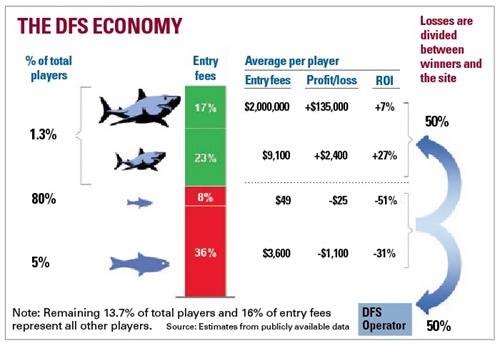 Turn on a TV or radio and it’s impossible to avoid the flood of new ads for DraftKings and FanDuel, “daily fantasy sports” gambling sites They’re working hand-in-hand with professional sports leagues like MLB and the NFL and advertising partners in sports media, investing hundreds of millions of dollars pushing the idea that anyone can win big. In reality, the sites are no different than casinos, the lottery, or day trading stocks, dependent on a vast pool of losers to fuel winnings for a select few – and there’s new evidence they may be skipping the games altogether & directly stealing money through insider trading.
Turn on a TV or radio and it’s impossible to avoid the flood of new ads for DraftKings and FanDuel, “daily fantasy sports” gambling sites They’re working hand-in-hand with professional sports leagues like MLB and the NFL and advertising partners in sports media, investing hundreds of millions of dollars pushing the idea that anyone can win big. In reality, the sites are no different than casinos, the lottery, or day trading stocks, dependent on a vast pool of losers to fuel winnings for a select few – and there’s new evidence they may be skipping the games altogether & directly stealing money through insider trading.
Attorney General Maura Healey is currently investigating DraftKings, headquartered in Boston in part because Massachusetts is one of 45 states that have not yet regulated daily fantasy sports gambling websites. It’s incredible that for all the decades of debate and legal wragling over casinos, daily fantasy sports gambling has snuck in and started raking in profits before lawmakers can even turn the lights on.
How big is the new daily fantasy sports racket? Enormous, and as Bloomberg’s Joshua Brustein reports, the average fan hyped in the ads has virtually no shot to win big:
FanDuel and DraftKings, the two main services, will bring in a combined $60 million in entry fees in the first week of the NFL season, according to Adam Krejcik, a partner at Eilers Research. Sports books in Las Vegas, by contrast, are expected to handle about $30 million.
To get to the size their investors are expecting requires a continuous stream of new players lured by ever-increasing prize pools with the help of muscular advertising campaigns. These ads never spell out a simple truth about daily fantasy competitions: While any player might get lucky on the back of a handful of entries, over time nearly all of the prize money flows to a tiny elite equipped with elaborate statistical modeling and automated tools that can manage hundreds of entries at once and identify the weakest opponents.
Even if that was the limit of it, daily fantasy sports would be a rip-off. 
But DraftKings and FanDuel employees have reportedly gone even further. As Joe Drape and Jacqueline Williams report for the New York Times, the sites haven’t prevented their employees from using insider information to bet with each other, and some of those employees have taken full advantage to rip off each other’s customers:
On Monday, the two major fantasy companies were forced to release statements defending their businesses’ integrity after what amounted to allegations of insider trading, that employees were placing bets using information not generally available to the public.
The statements were released after an employee at DraftKings, one of the two major companies, admitted last week to inadvertently releasing data before the start of the third week of N.F.L. games. The employee, a midlevel content manager, won $350,000 at a rival site, FanDuel, that same week.
Even before the insider trading scandal broke, Deadspin’s Drew Magary called daily fantasy sports gambling “evil.”
In the big picture of America’s economy, what’s scary is that this basically how day trading stocks works: The average customer, encouraged by a massive ad blitz, thinks he can get ahead by watching CNBC and reading a few websites. In reality, the vast majority of day traders stand no chance against an army of analysts and supercomputers making millions of calculations and thousands of moves a day. Again, it’s a con and all of us are the marks.
I look forward to Attorney General Healey taking the first steps toward protecting consumers from this scam.
I saw the ads plastering every piece of media leading into football season and kept thinking that a reckoning would be coming. I didn’t think it would have been the deep shadiness of the employees that would have really tripped them up, though.
Compared to online poker, these sites probably didn’t get the same scrutiny because they weren’t hurting the casinos and causing the casino industry to lobby Congress. They fall under the loophole of “games of skill” which is absolutely true for season-long fantasy leagues (in the same way that poker is a game of skill over thousands of hands). Weekly leagues, however, are definitely games of chance (just like a few hands of poker), and should not fit in the current loophole.
…would be to prohibit employees of these entities and family members thereof from participating. Even harmless radio sweepstakes do that.
But what they didn’t do prohibit them from competing on competitors sites, which also seems like a no brainer to me. The other issue is the algorithm they use to calculate scores is apparently a trade secret and one that those in on the know could take advantage of, so it’s closer to insider trading in the scope of the crime.
I think it should be better regulated and I am glad the AG is looking into it. That said, it’s important to distinguish this from actual fantasy football, which is usually played in groups of people who know each other without a lot of money changing hands (although I winning my league last year paid for my plane tickets home). We don’t want to ban that.